8 ways to Gamify Your Recruitment Process
WARNING! This is a really, really long post!
Gamification according to Wikipedia
Wikipedia: Gamification commonly employs game design elements which are used in so called non-game contexts in attempts to improve user engagement, organizational productivity, flow, learning, crowdsourcing, employee recruitment and evaluation, ease of use and usefulness of systems, physical exercise, traffic violations, and voter apathy, among others. A review of research on gamification shows that a majority of studies on gamification find positive effects from gamification.
Gamification is not actual games, but use of game-like mechanics to activate people in various ways. The activation methods, triggers, could contain virtual or real life rewards, statuses, badges, levels, points, credits, “easter eggs” (special surprise rewards), vouchers, discounts, gift cards, or even concrete prizes.
The one thing in common with all gamification cases is Engagement. It just varies who's being engaged, for what, and especially how.
The gamification of recruitment and HR processes has been a frequently discussed topic at various HR forums for a few years now. Only a few people really seem to understand what the gamification methods are or what the benefits may be. Everyone seems to have an opinion and a certain point or case example to show, but the big picture seems to be missing from just about everyone. Here's my take on the topic!
Gamifying the recruitment process falls in my book into 8 main categories - the what and why
Category 1.
What? Activate employees to share recruitment ads and employer branding content
Why? Company personnel has on average 6 times the network reach the company has. Personnel is also the most trustworthy advocate a company can have
Category 2.
What? Activate personnel to give referrals, point us to the right direction, who are the most interesting individuals in their networks we should consider hiring
Why? To hire the best of the best and better cultural matches, people who fit in the team.
Category 3.
What? Activate our fans, friends and followers or even the applicants to share our content in their networks
Why? To gain awareness and for brand building purposes, sometimes just plain ol' marketing
Category 4.
What? Activate the top specialists out there to apply with us
Why? You want to attract the best individuals, not just anyone unemployed desperate for a job
Category 5.
What? To educate the applicants about us. Give the applicants a possibility to understand better our organisation, the company culture, our values, the job content, methods, tools & technologies, etc., in order to make better decisions whether to apply with us or not.
Why? To avoid cultural mismatches. In short, it's transparency, and that's the name of the game these days. The applicants will search for information about you and how you treat your employees and a number of other things - whether you want it or not.
Category 6.
What? Test the potential candidates if they have what it takes to work with us (while helping to understand the working environment, and more).
Why? You want to test the applicants as well as possible before making the decision. Firing is often more difficult than hiring.
Category 7.
What? Educate the potential candidates how to apply better
Why? To make candidates more comparable with each other and to guide them to apply in the right way through the right channel with the right kind of application. Of course you'll be able to spot the best ones more easily if they know what you're really looking for and how the process works.
Category 8.
What? For simply marketing purposes, to build employer brand or to gain media exposure with no greater cause or agenda behind it
Why? What is the purpose or marketing or employer branding…
The "what and why" are easy to understand, but "how" is much more difficult. Gladly we have some great examples from around the world available.
Many of the following examples don't fall into just one category, but have elements where actual tests or application processes work well as marketing and branding campaigns as well. There are interesting combinations in play, see what you could learn from these examples.
Enjoy!
The Idols and Apprentice models
A number of organisations have done Idols-type of auditionings, where people get to "audition" live in front of the recruitment team. In some cases there have been great amounts of people who have gathered to audition for a job, and sometimes even chaos when there have been more applicants than what the company can handle. The airline company Finnair had a "service angels" auditioning, an open event for applicants to come for these speed-date interviews, and hundreds of people came over. Not all wanted to wait for their turn, while there was a queue hundreds of meters long, and some of the applicants started complaining about the queues in Facebook. Not good.
Vila, a clothing company, organized a live auditioning to quickly go through the applicants when looking for sales personnel for their clothing store. 136 people showed up, quickly auditioned, and a small number progressed to a more in-depth interview. The company was looking for people with certain attitude, and surely style, oral skills and looks must have played a role in the process as well, even if not openly admitted. 4 people were hired, but they failed to find a Shop Manager with this method and relied on more traditional recruitment for this position.
The skillset in both of these cases was fairly simple and the weight was on finding people with the right attitude and "appearance" more than certain education or experience.
A software company I know well, organized The Apprentice type of recruitment process to find a suitable person. They told the applicants upfront that 3 people will get a short term "try-out" job contract to prove their skills while working, but only one of them would get a permanent contract after the initial try-out period. This allowed the company to test the applicants in real life situations and test the cultural fit as well as skills while all having to perform similar (or even the same) tasks. The process gave room for better evaluation of the applicants as a whole. To lie or pretend in a short interview or two is easy, to pretend everyday for a month is almost impossible.
Employee engagement
Employee engagement is one of the most hyped keywords these days in marketing, but now also in recruitment. And not just engagement of employees, but all relevant stakeholders out there. How could we leverage people's networks, build loyalty, enhance sales and marketing, collect product and service ideas, build employer brand, activate internal and external brand advocates, and in general drive customer-driven business development?
There are great tools for different types of engagement and community building. We could use Sprout's or Meltwater's tools, or services like Smarp or People2Join, or just ask our personnel what they'd be willing and interested in doing for common good. Would they share the recruitment ads to their networks, would they be willing to tell their career story on a video, post a message to a user/developer group, or come and stand at our booth at a career fair?
Especially the use of different technical tools is fast becoming popular, after all, it's seems like it's easier to tell the people how to use a tool than change the culture and mindset... Just saying!
In the best cases people are really committed to helping the company hire the best people out there, people are proud of their employer and happy with their work, and share the content often even without asking. They want to influence who's being hired. After all, nobody wants a colleague they have to drag behind. The best want to work with the best, and for that purpose it's important to give our personnel a face and voice, to use them as our honeypot for even better applicants. And in many cases our specialists know better than our recruitment team where to look for those passive candidates.
The gamification part? To activate people you sometimes need to create small internal (or external) games, give prizes or keep a leaderboard. A small thing to do to get the vast networks our personnel have, to work for the corporate good.
Actual games
America's Army is by far the most famous of actual games organisations have developed (or at least planned and ordered) to tell people what they do, how they do it, and in some cases even to test the players' skills who's be the best match of them all!
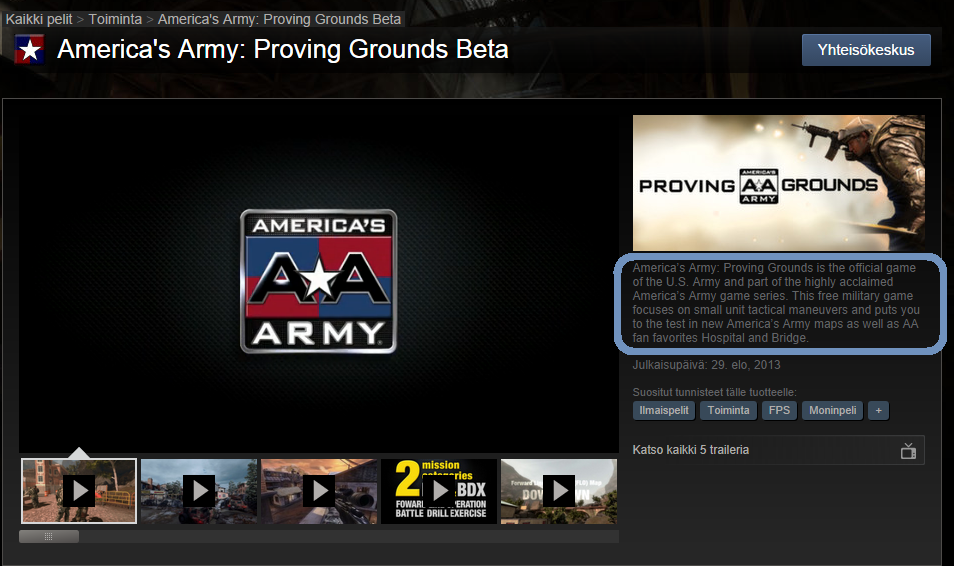
Russian Army has had simpler games for the same purpose, and a number of organisations have used small Facebook "games" to engage people and to educate them about our opportunities and what it requires to apply with us and do well in certain positions. Some organisations have done it for long and with great success, some have tried it out and given up.
Accenture, especially in the U.S., has used different Facebook games for a long time and with great results, while Marriott Hotels had great plans which never were realized as the first game didn't work quite as well or give the kind of results as planned.
Shell has had some success with their browser game, the Shell Explorer Game, and it's got some really nice features in it. You don't even have to finish the game to be able to apply or to understand what it's trying to say. It gives nice insight into Shell's operations as such. The only problem I see with it is it being a browser game. So it needs Internet connection and it takes some time to load.
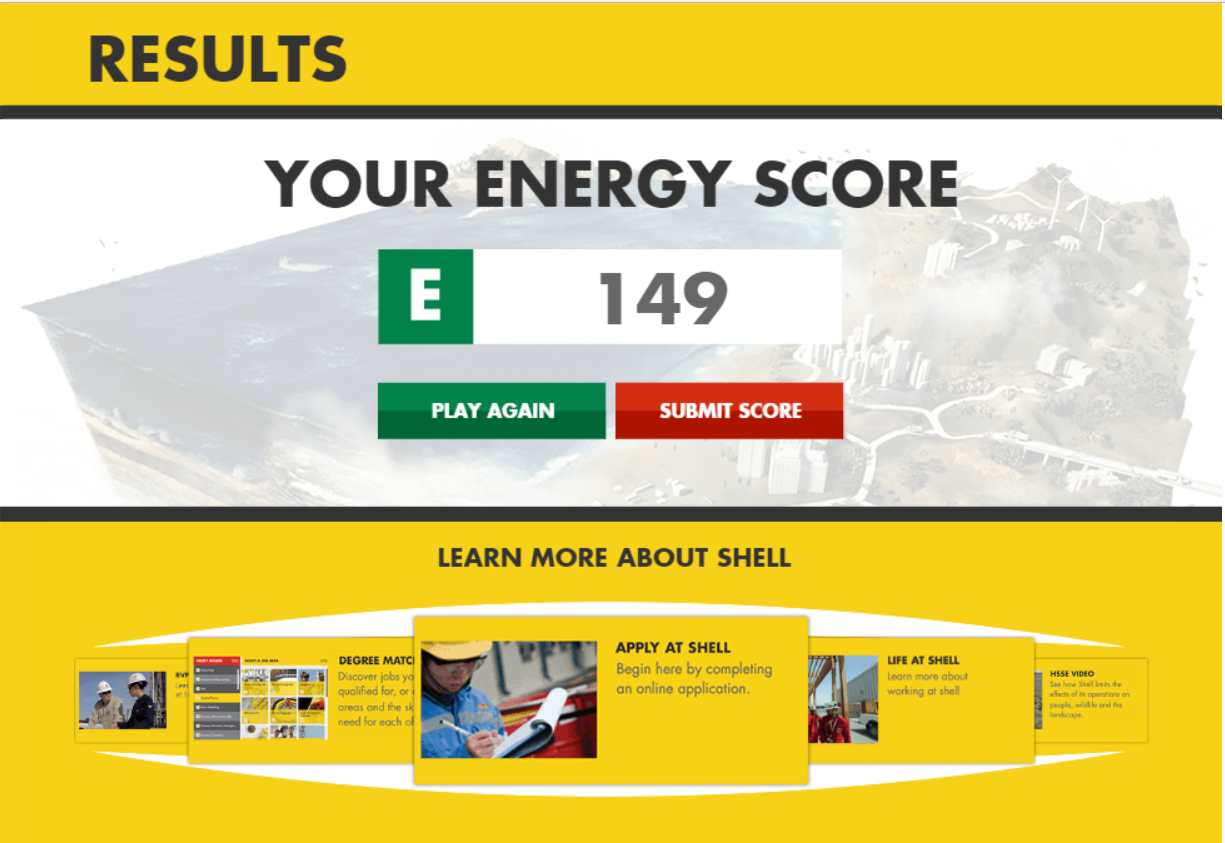
With fairly little effort, a game can give great insight into what a person can do or is interested in doing. It also builds nice engagement, and can explain really nicely what is required to work at the company and at certain positions.
Some of the organizations using actual games as part of their recruitment toolbox are e.g. Wells Fargo, WalMart, Medtronic, SAP, Sun Life, T-Mobile, Dell, Hewlett Packard, McAfee, HBO Europe, Huawei, Booking.com, VMWare, Sabre, U.S. Foods, D4, International Hotels Group and Anheuser-Busch.
Can you identify others?
Online tests and challenges
Online skill and psychological tests are often boring and in many cases nonsense. I wouldn't trust most of them. But using light and easy to use tests for activation and building engagement, sure, I'll buy that.
One interesting example is ISS (the facility services company), who have used a Facebook test (they call it a "game") to engage people to think about their career choices and what the company could offer them. Fazer, a bakery / confectionary company, has used Zef's survey tool to build a career test, similarly to ISS trying to activate people to think about their career choices and to activate them to apply with the company. Different technical solution, similar ideology and similar results. In fact, these tests don't produce any actual value to the user, only engage them to consider the organisation as a potential employer.
Some of the more complex tests could earlier be found at the Accenture U.S. Facebook page, but for some reason they are not available anymore. Same with Marriott's Facebook game that educated about their jobs and activated people to apply.
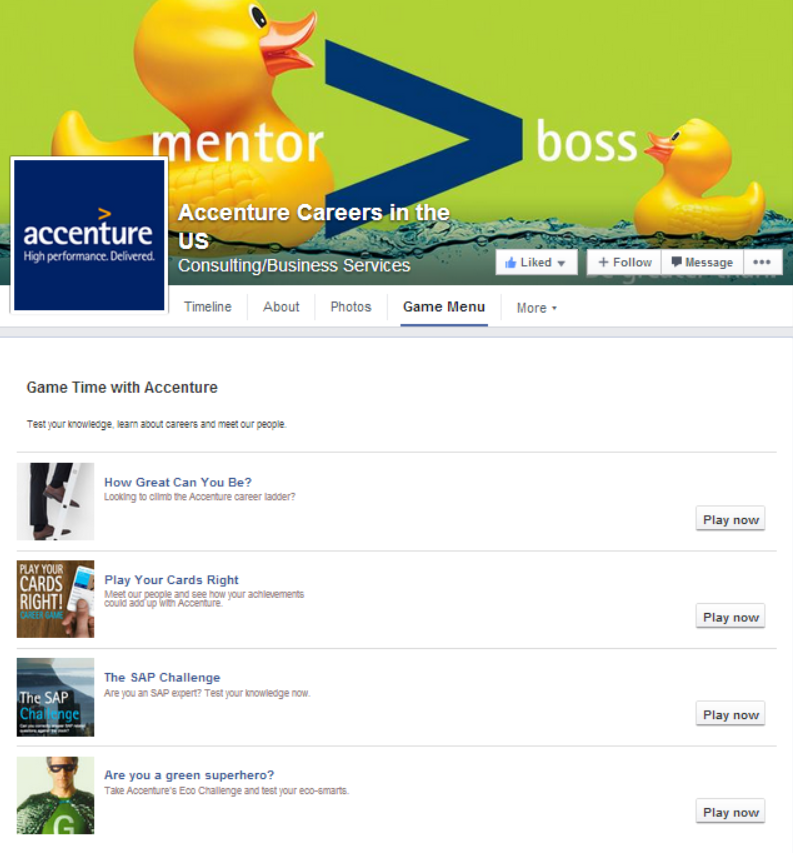
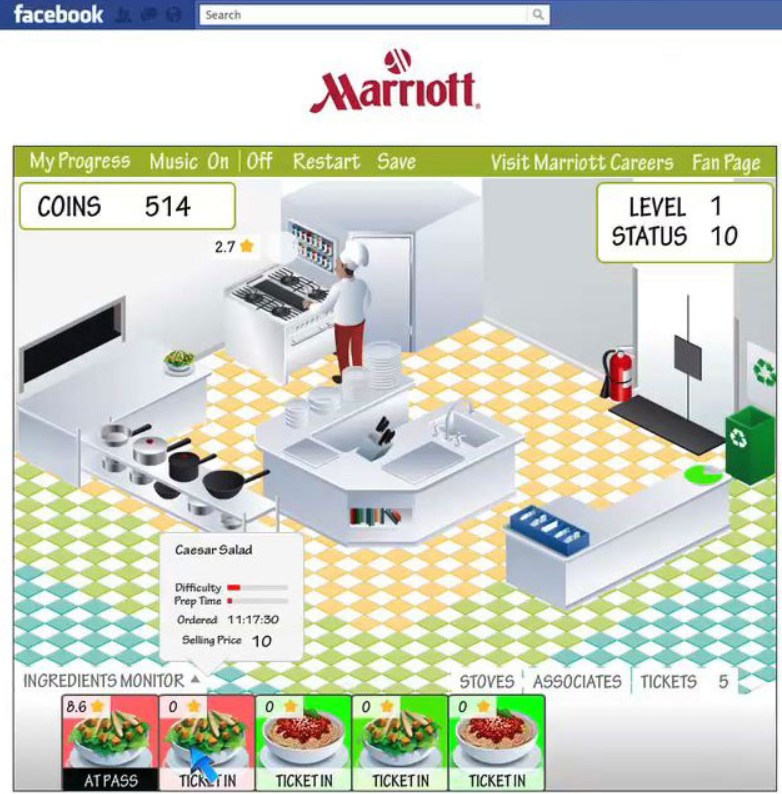
Educating the applicants
Like with Marriott's Facebook game and Shell's browser game examples, the point in many of these efforts is in educating applicants what it would be like and what it requires to apply with and work for the company and at certain positions.
There are great examples available, like PricewaterhouseCoopers Hungary’s 12-day Facebook game Multipoly, New Zealand's Air Force, and L'Oreal's career app “game”. They work very differently, but try to achieve the same result; to explain about different jobs and context, what happens within the company.
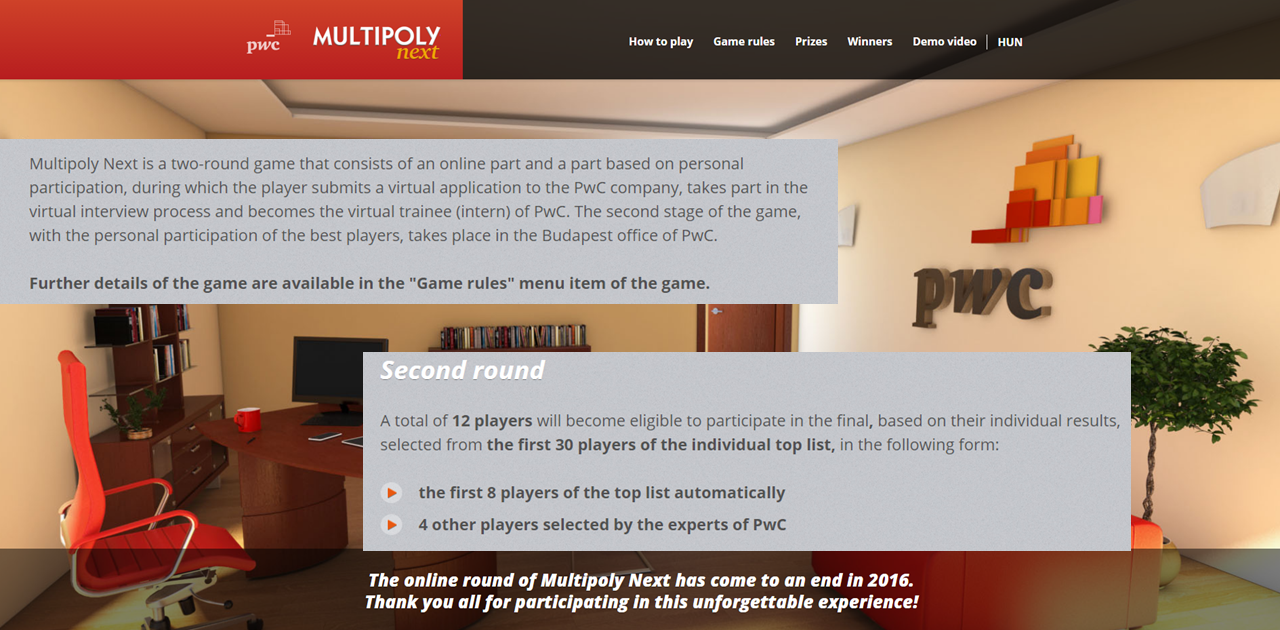
New Zealand's Air Force wants you to understand all aspects of becoming an employee. The roles available, salary level, typical educational background, duties, and more. The gamification in this case is how the roles are showcased and explained. Check this out, a simple but very effective and useful one.
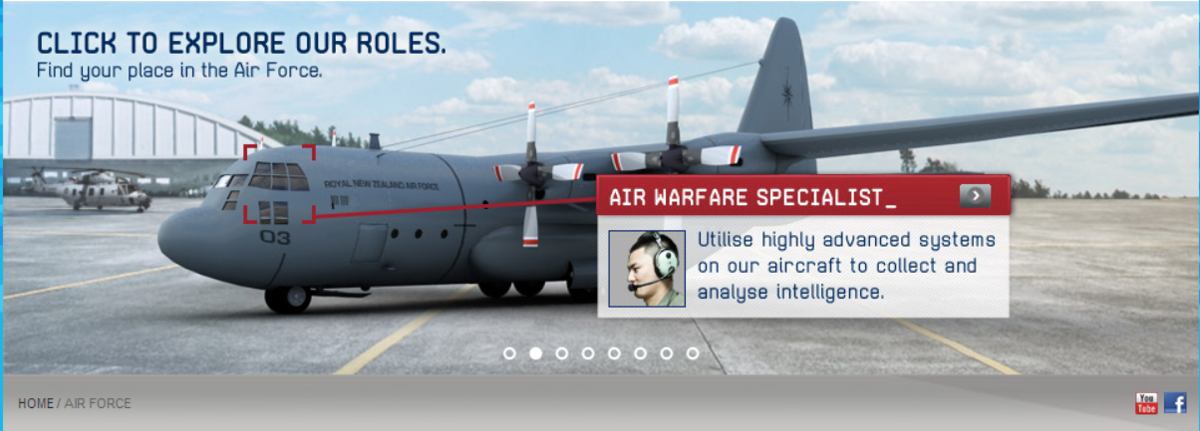
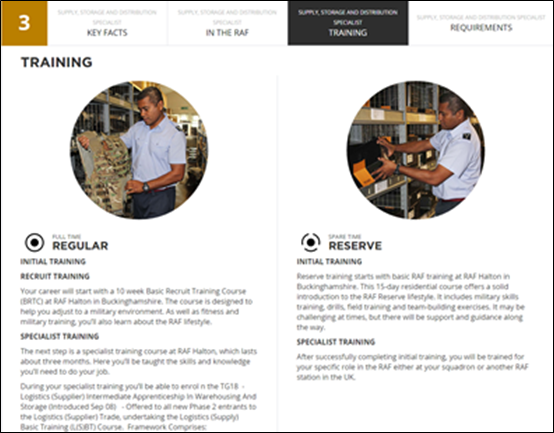
At L'Oreal's mobile app game you get to choose a field of interest, and you're then guided (with a character) to make decisions like you were working with the company. And at the end, of course, you're activated to apply with L'Oreal now that you've proved yourself worthy and stated interest.
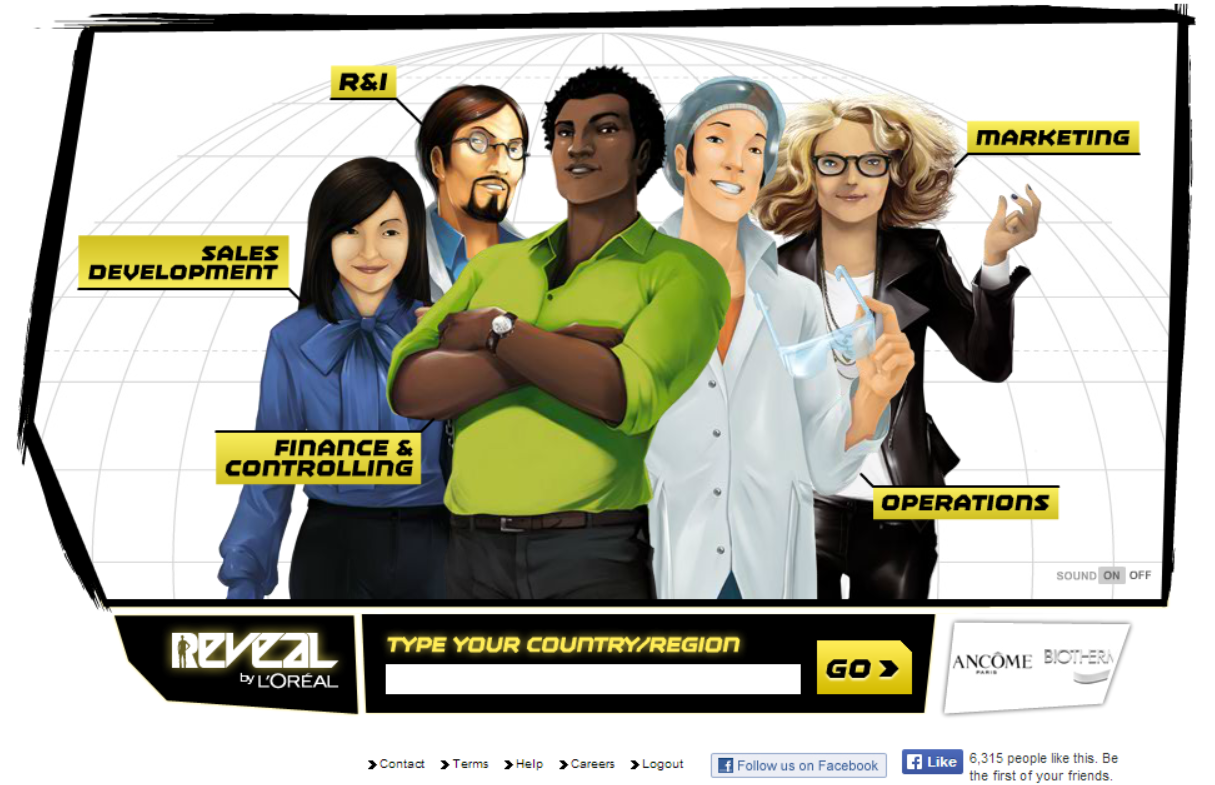
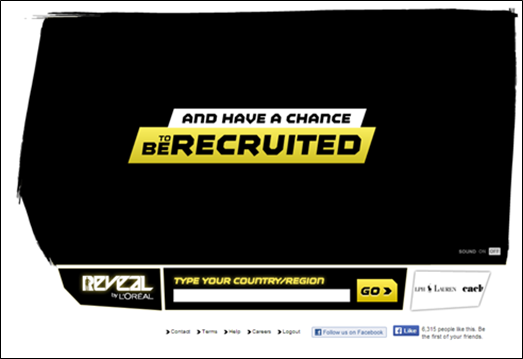
French Postal service Formaposte explains a normal working week of a postman, with an actual game. All the way from taking morning showers to making decisions regarding the delivery.
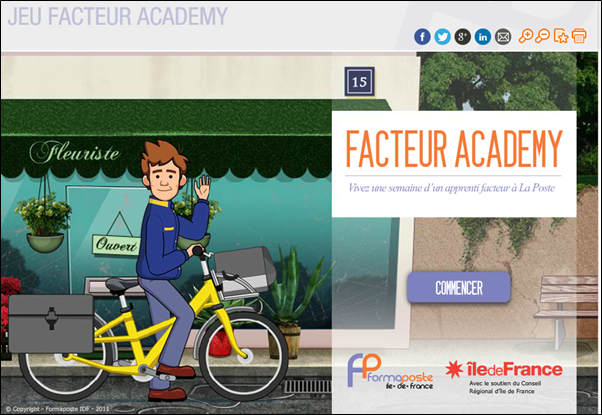
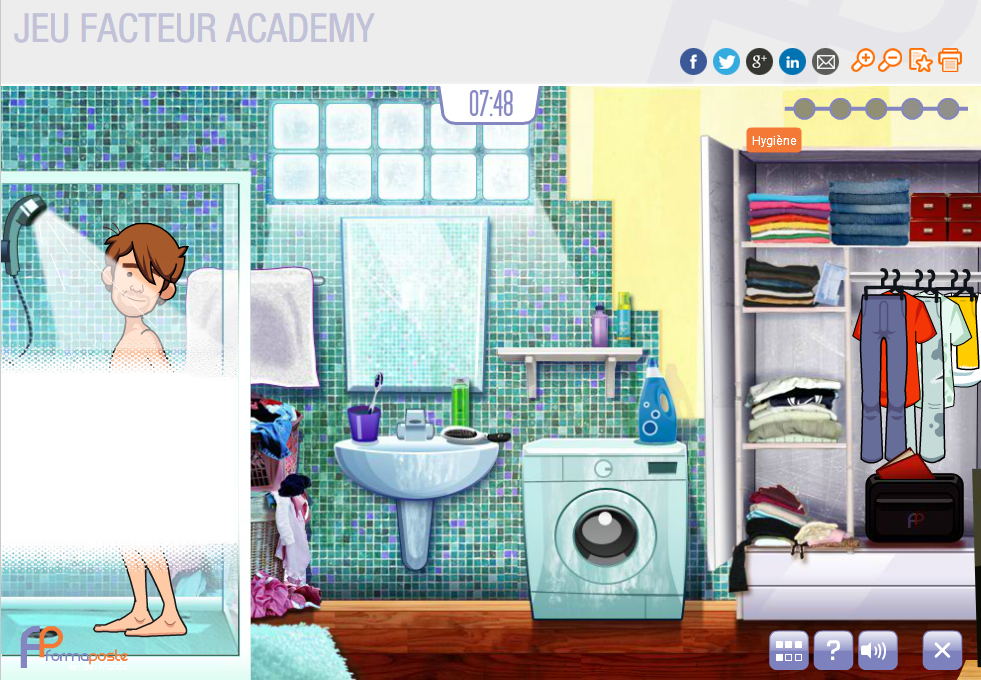
Social activity and skills testing hand-in-hand
Some of the games and gamified content activate people to like, share or comment recruitment ads or employer branding content. Some are more focused on actually testing people or at least showing what the job is all about. Often while activating people to share the content.
Next you’ll see some interesting examples, but remember to also check out Indian TechGig’s coding challenges, Techniqueen.at’s challenges, IGN’s Code-Foo challenges, and Google’s Code Jam sessions.
How would Enterasys’ job application process sound to you, would you apply or even be eligible to apply?
…need to apply via Twitter with certain hashtag, have more than 1000 Twitter followers, need to have the social influence score Klout above 60 and similar Kred score over 725 (High!), and they will crowdsource Twitter for public endorsements!
So you need to prove that you are an influencal communicator in real life to be able to even apply.
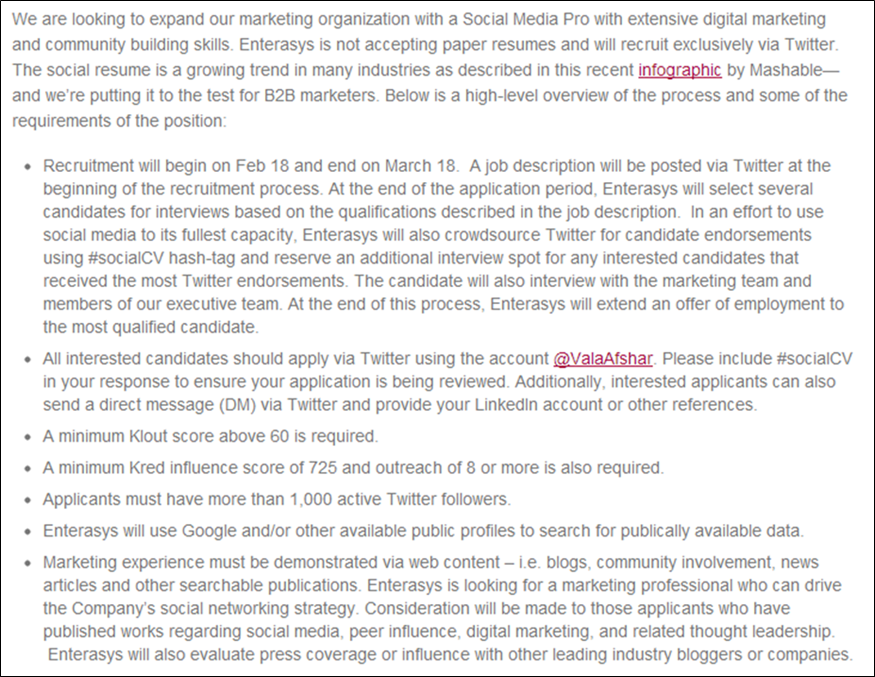
You may have heard about probably the most extraordinary recruitment case ever, at least the one that has gained most media exposure. W+K's social media challenge for their Old Spice account.
Wieden+Kennedy (W+K, the Old Spice's designated advertising partner) asked applicants to create social media content to 10 different media, using their skills and networks to show they have the understanding of these media at a level creative enough for W+K to even consider them. Here are the 10 categories of which at least one was required, and all without explaining to anyone that this content is related to a job application. Pretty crazy requirements, right?
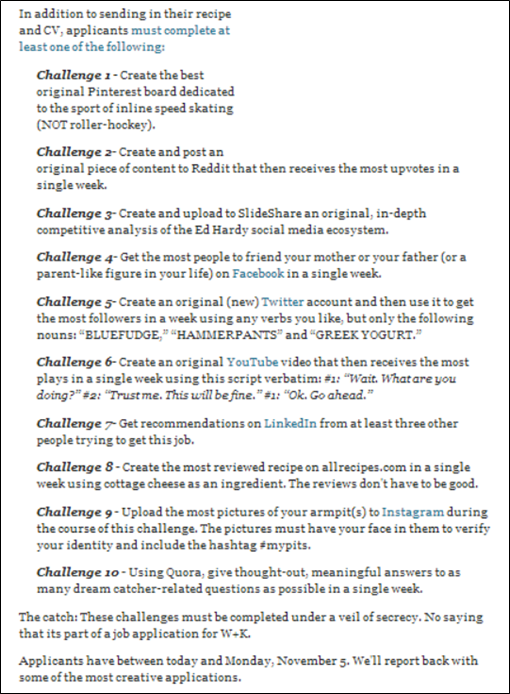
Arla's #socialhunting case is one of the most interesting ones. Arla was looking for a Marketing Assistant, and wanted not just to test their skills, but use their skills to do promotion for Arla at the same time.
Candidates needed to create a max. 30 second video of themselves, explaining why they love Arla and why they would be the perfect match for the Marketing Assistant job. And to prove their skills, they needed to spread the video across social media with the hashtag #socialhunting.
Arla promised that the applicants with most views, likes and shares would automatically get to the interview stage, and they would then additionally pick a couple of applicants they liked best based on actual skillset and content. Unfortunately it's not public information whether one of the "audience favorites" or staff picks got the job... Anyway, a great amount of visibility for the company, explaining in so many ways why people want to work for Arla and how they appreciate the company.
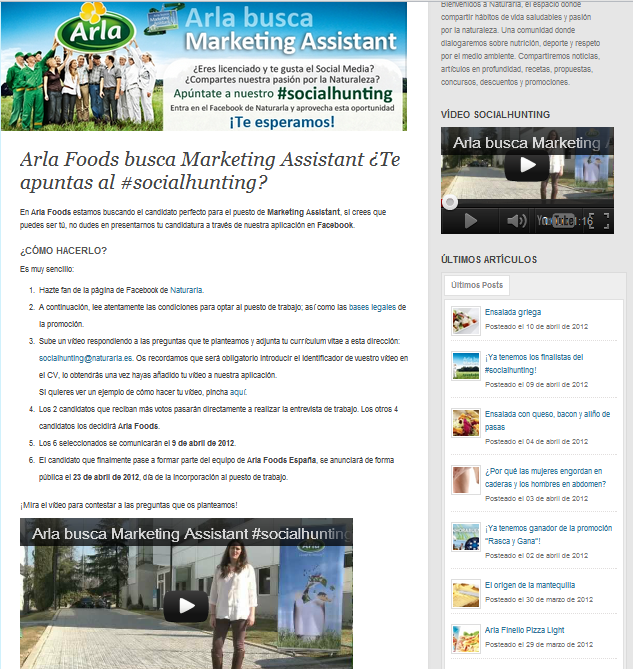
Domino’s Pizza has a great tablet app game, where you need to first learn to make a round pizza. If it’s not round enough or the right size, you can’t progress. Once you pass, you then need to spread the tomato sauce. If you pass, you get to add toppings, then use just the right amount of cheese spread evenly on top of the pizza. Then the pizza needs to be cooked properly. Only after all levels passed, you are ready to apply with Domino’s. Fail? No application, please!
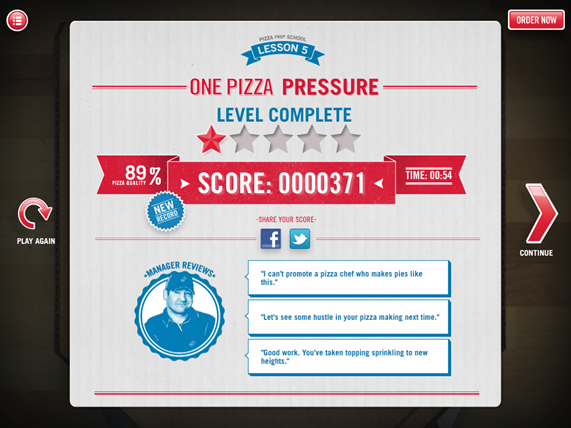
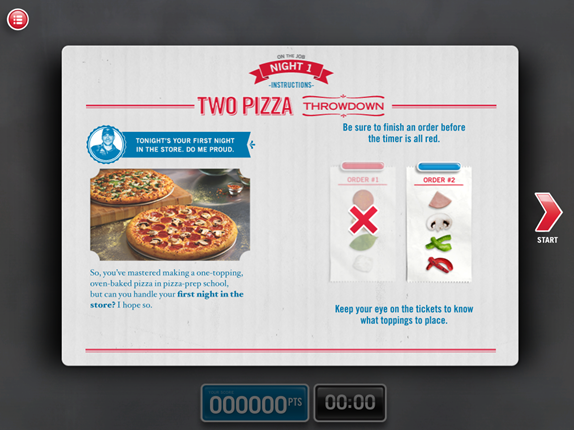
With the recruitment agency Hays things are quite simple. Look through a few interview videos and decide who's the best candidate, and apply to become a recruiter!
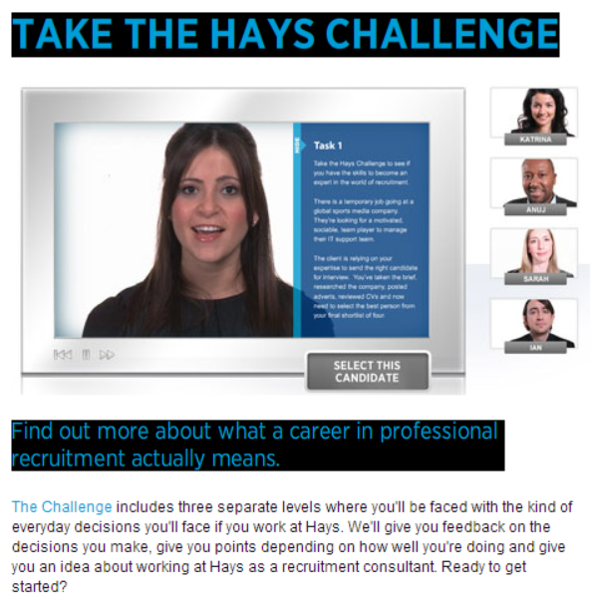
Australian Air Force is one of many defense organizations using gamification methods to activate potential candidates and to test them.
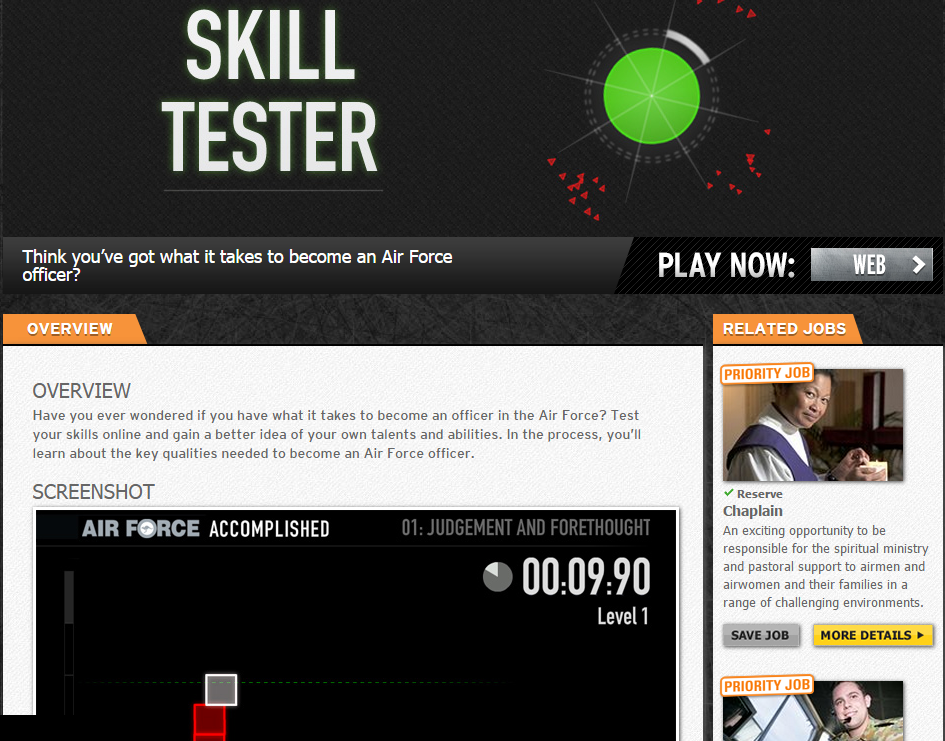
Here's the British intelligence agency MI5's gamified test for future surveillance officers.
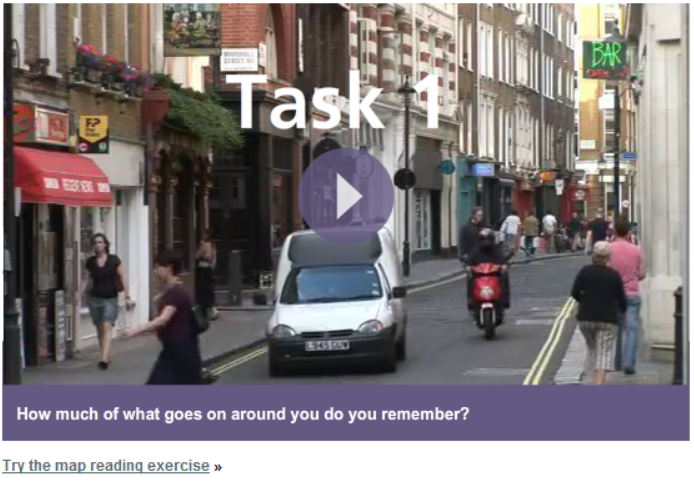
For actual testing of candidates, some organizations make the applications not just funny, but difficult to pass. If you can't crack the code, don't apply with the British intelligence agency GCHQ...
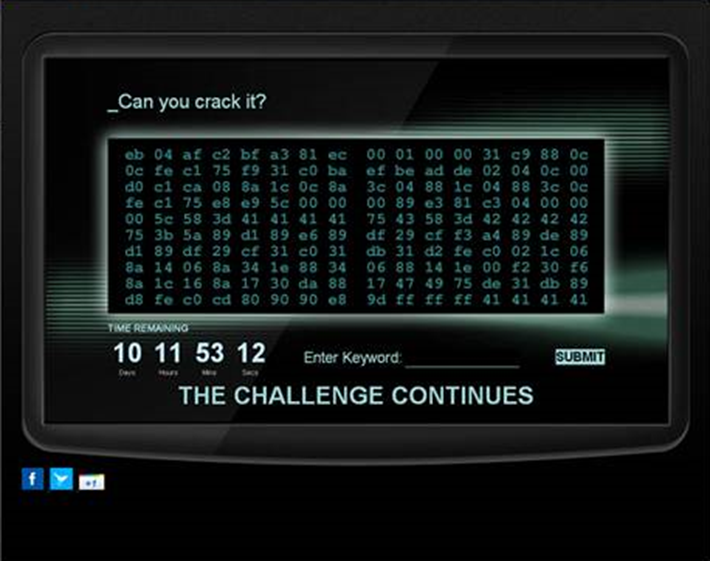
Qvik is not as strict as GCHQ where you have to really pass the test in order to apply. With Qvik you can just play the puzzle and they'll decide whether they want to interview you or not.
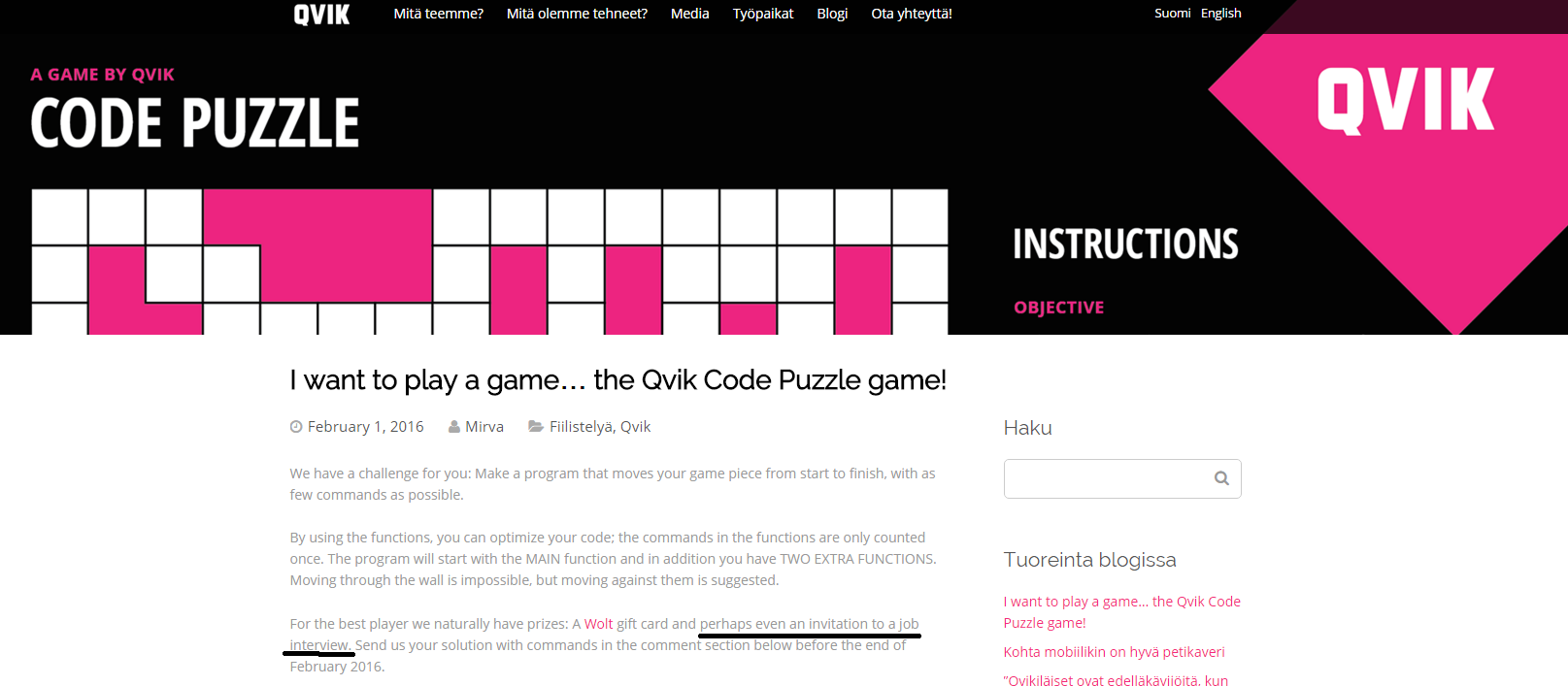
Sometimes things don't go quite as planned, thou...
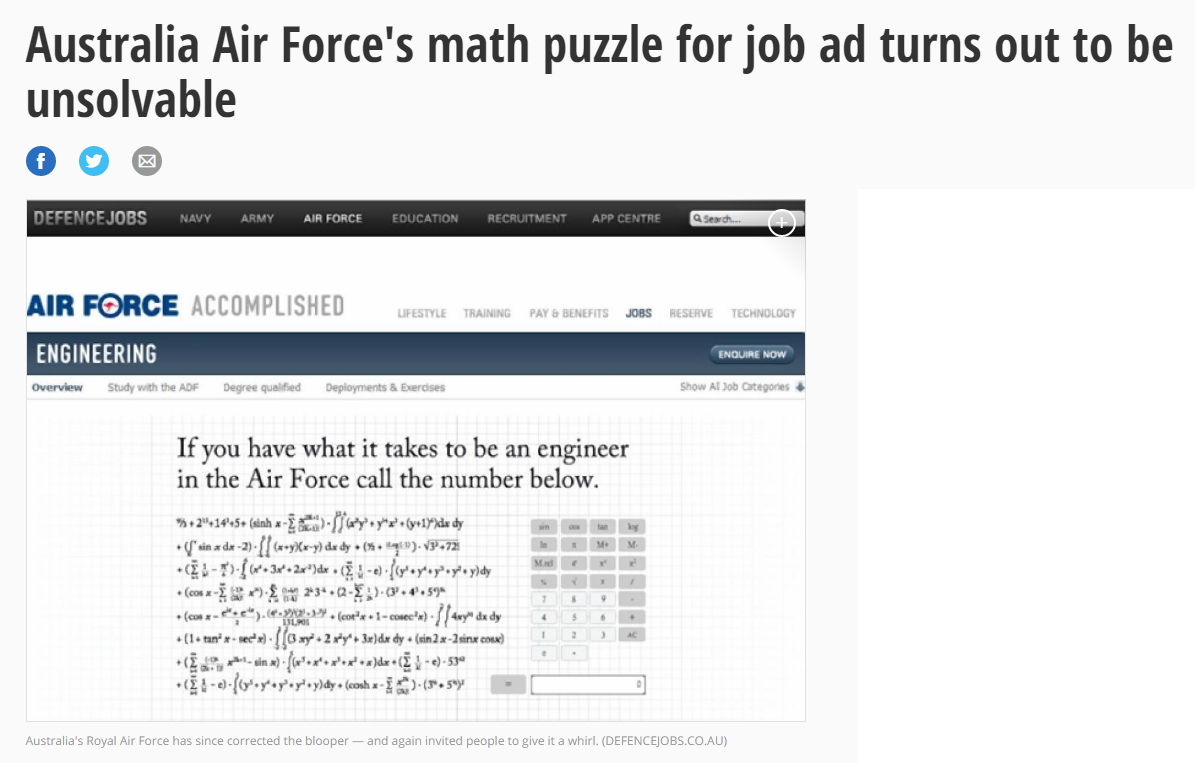
Ernst & Young takes testing seriously. They have created several different logic games to test your ability solve problems. And some of the games aren't easy, far from it!
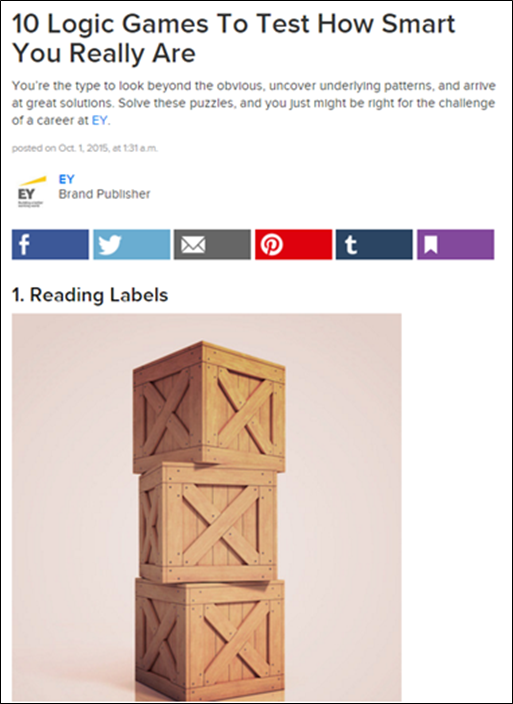
Referrals, incentives and bonuses
The use of employee engagement tools like Smarp is becoming popular. There are both upsides and downsides with technical tools, but properly used they can help the organization reach out to greater audiences than with just about any other means. If you can activate your personnel, not to talk about their networks, to spread the word for you, that's worth a looooot of money.
These tools are built to activate the users with a number of gamification methods, such as giving them credits or points, statuses and badges, they have leaderboards, and even actual concrete real-life prizes for the most active users!
Here’s one job ad distributed to Facebook with Smarp's SmarpShare tool, by an employee of Borenius Attorneys.
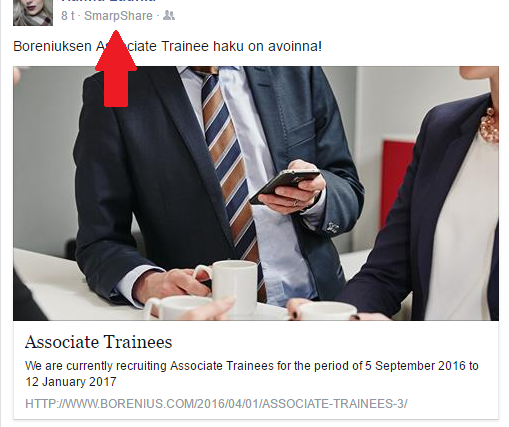
LinkedIn has recently published 2 interesting mobile apps to support this kind of behavior; Elevate and Referrals. Elevate is an employee engagement app, available for organizations with 500+ people at LinkedIn, whereas Referrals engages employees to share your recruitment ads and refer people from their personal networks towards the recruiter. Elevate is available already, but Referrals is available just for a very small group of U.S. based bluechips for now.
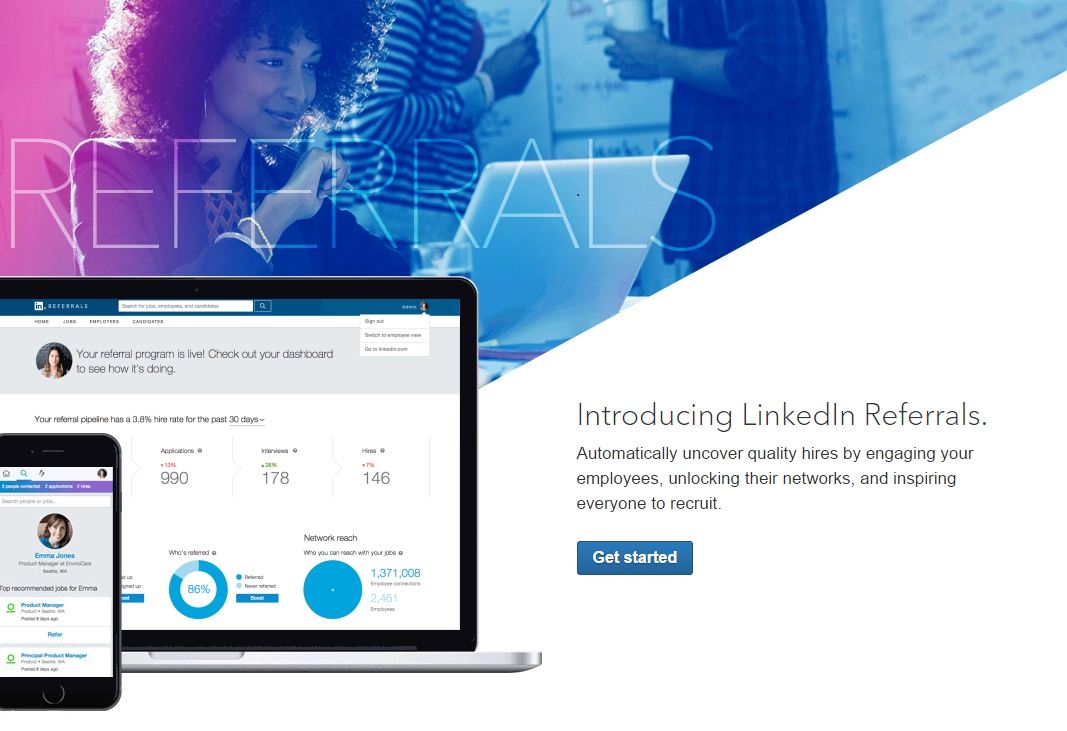
Funny little things
The gamification could happen just about anywhere, proves Spotify. Here's a funny little thing one of their recruiters did to find interesting people from all over the world. And all tailored to You, individually, and using their own platform. Pure genius!
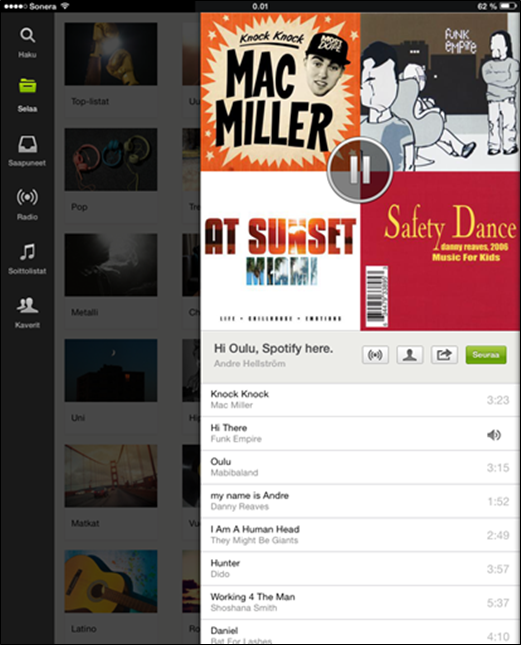
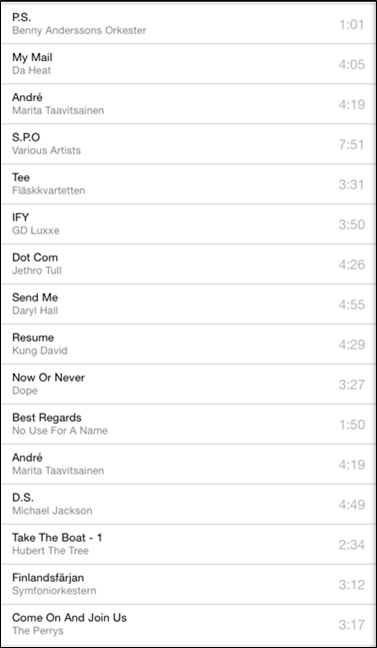
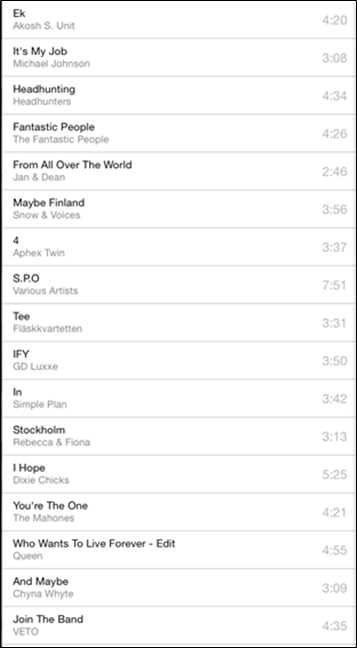
Did you see it? If not, go back and read the song names! Nice touch! A headhunting outreach as a Spotify playlist!
Jaguar Land Rover doesn’t use quite as much effort as Spotify, but they don’t fall short much.
Here’s what they do at Instagram with pictures and clever short videos. Do the tasks seem easy?
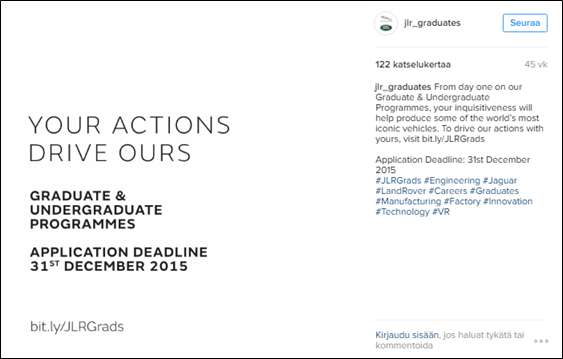
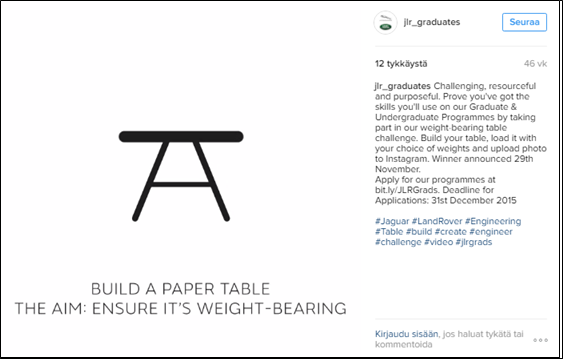
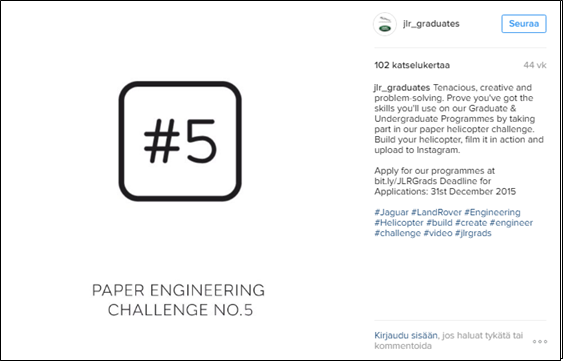
How would you feel about using max. 140 characters and having to post your job ad without words, using only emojis/emoticons?
Well, L’Oreal’s done just that! And of course, some smartass applicants have applied using only emojis… Good luck identifying the best candidates!

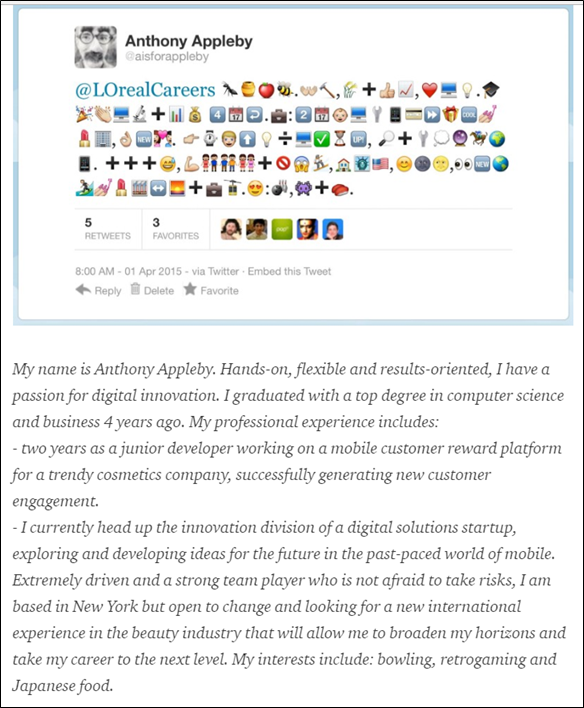
Sometimes the effort is not that small, like with Heineken’s new campaign ”Heineken Go Places”, where they have built a webtest that guides you based on your own interests through their portfolio of products, business areas, and more, in an engaging, funny way. Check this out, here are only a few steps along the long way of going through the video-driven engagement process! The process functions also as a sort of a personality test.
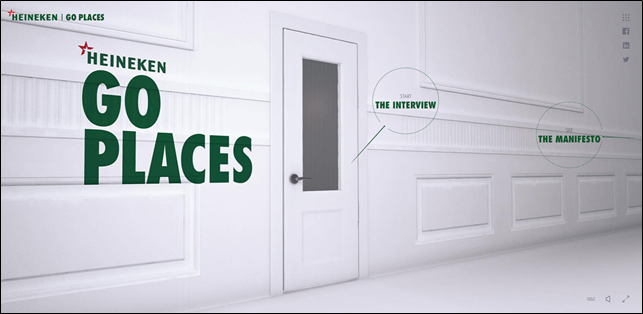
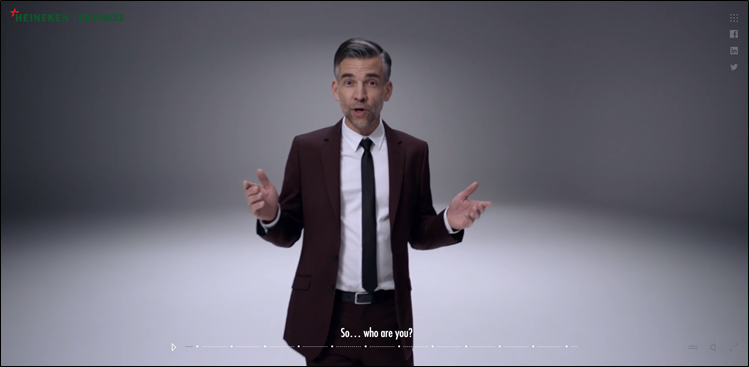
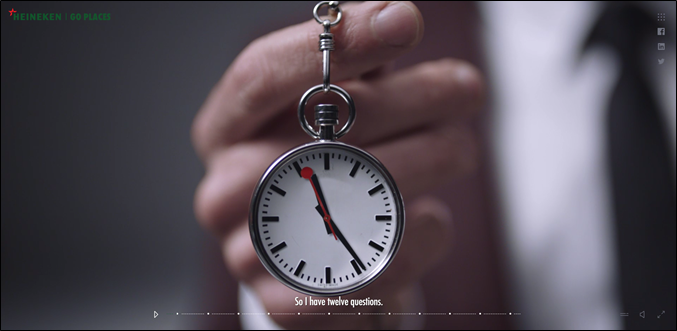
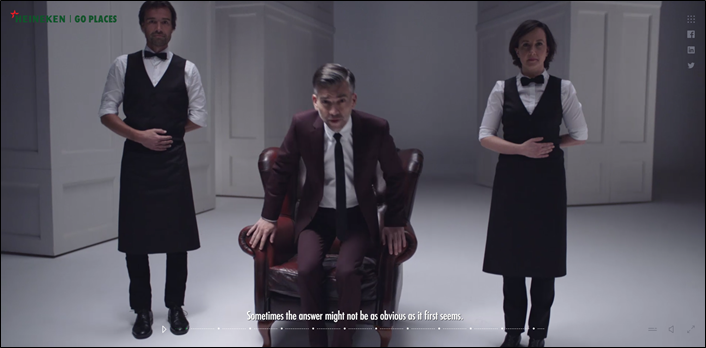
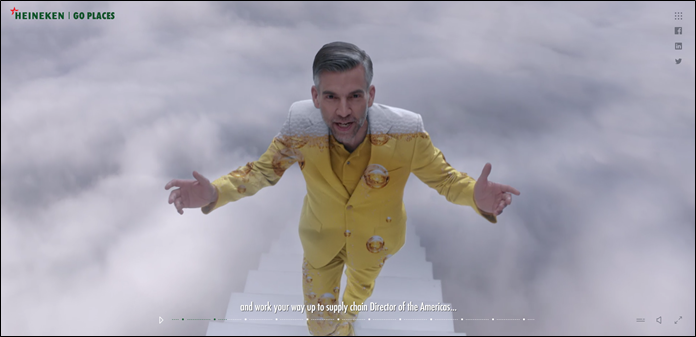
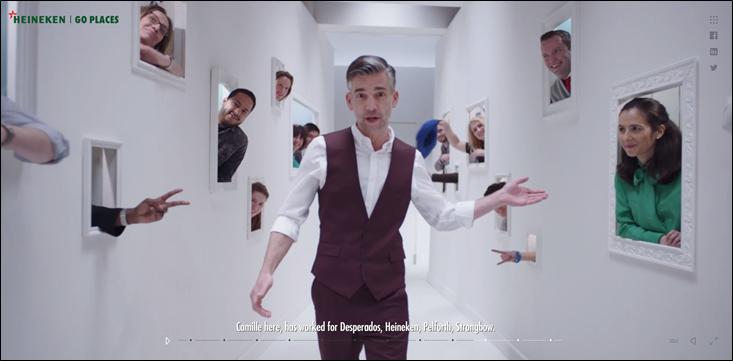
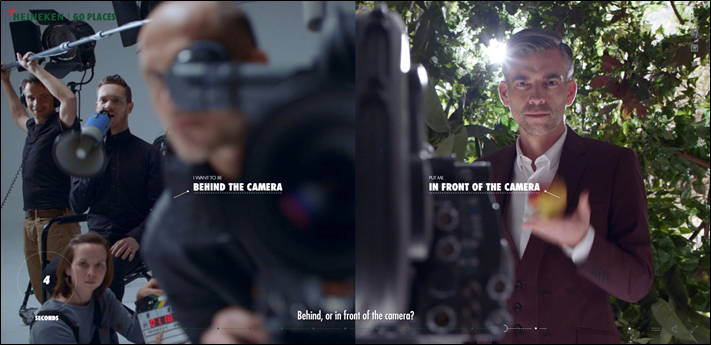
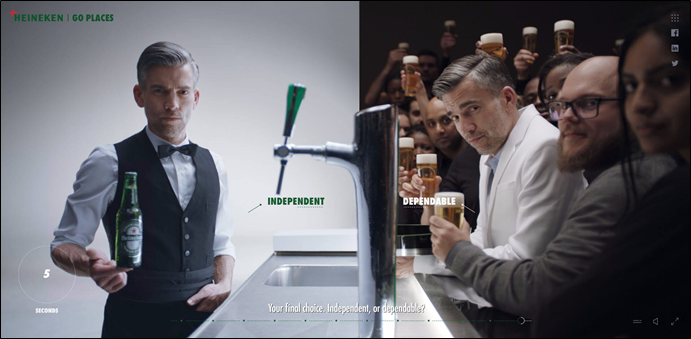
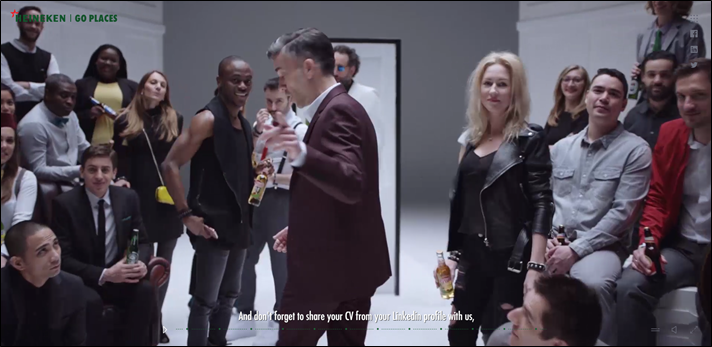
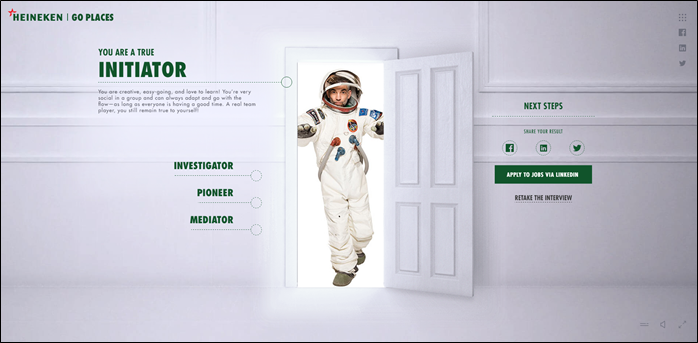
What recruiters first, candidates second
We've seen the number of gamified job applications, creative application methods and funny availability announcements from all over the world during the past few years. If recruiters find a new tool to post job ads at or network or build employer brand, you can be sure a few job applicants will do the same their own way, trying to enhance their possibilities of being found at these same tools and media. Here's a couple of the most interesting examples.
Nina really wanted to work with AirBnB, so she created a website with content looking like AirBnB and about how AirBnB could benefit from her knowledge of certain markets. And started attracting attention to her website in hopes for AirBnB to notice her effort.
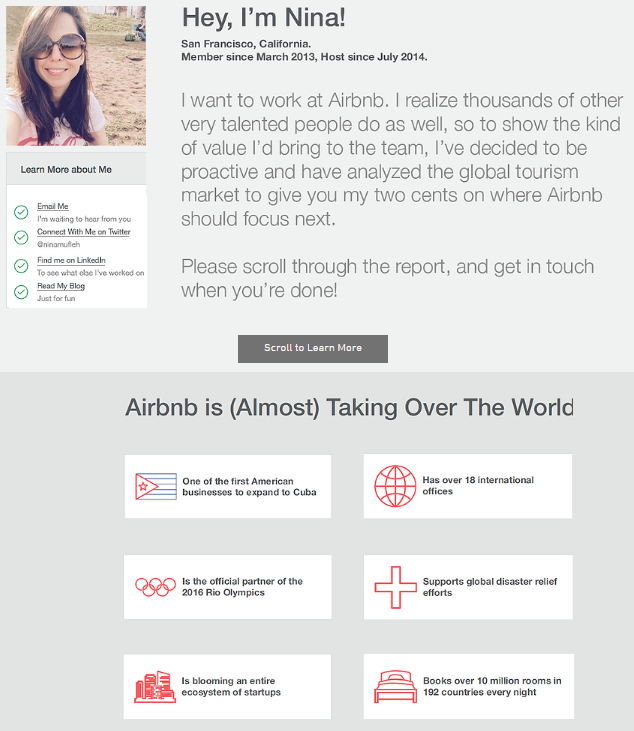
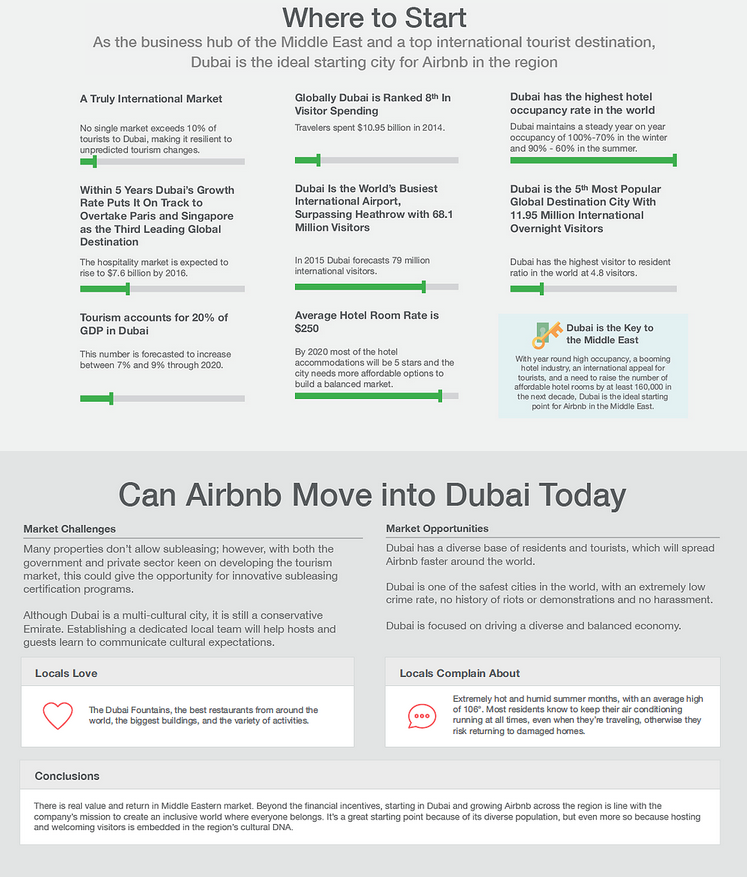
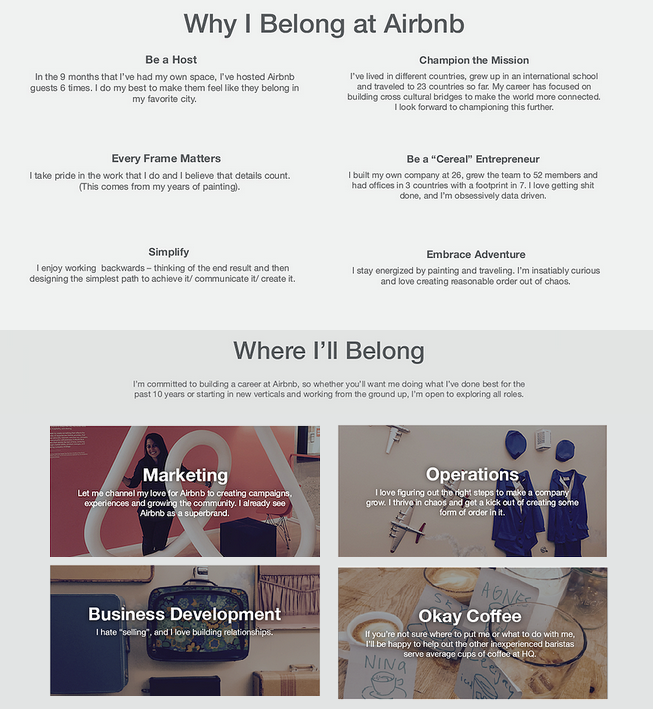
Robby Leonardi wanted to find an interesting new job, but wasn’t sure what the perfect job would be, so he put his skills and expertise in play to receive job offers and to see what the world has to offer. And the world noticed Robby…
To progress in the game, you needed to run your character thru a few levels, all explaining different sides of Robby’s skills, interest, achievements, and more.
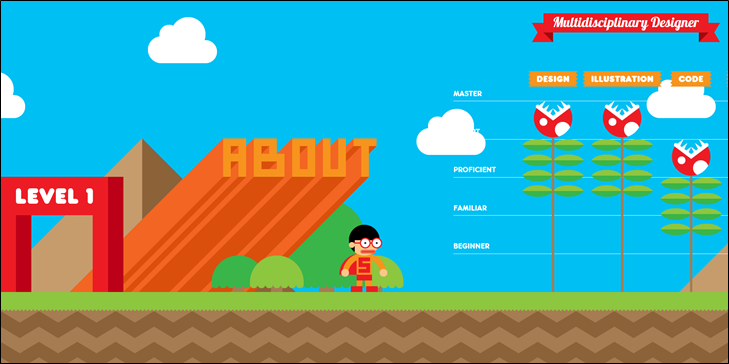
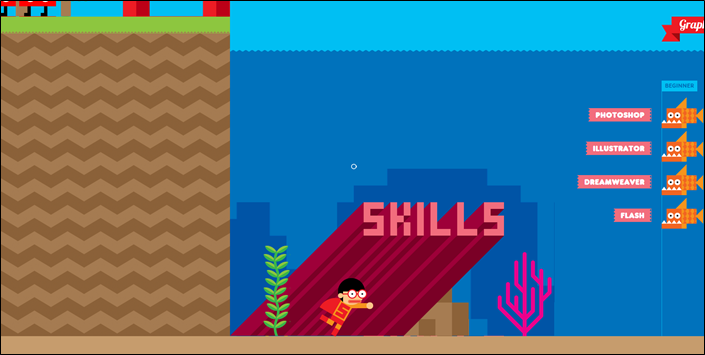
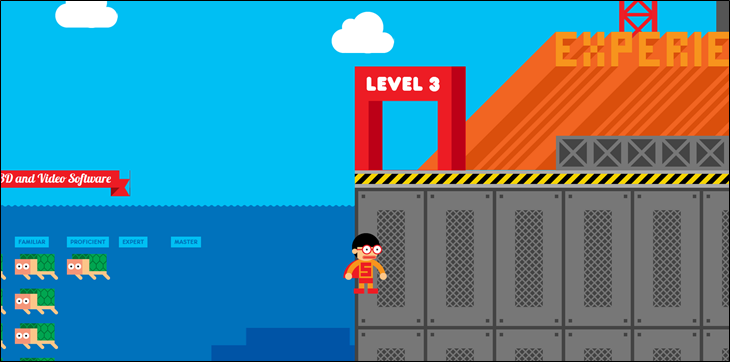
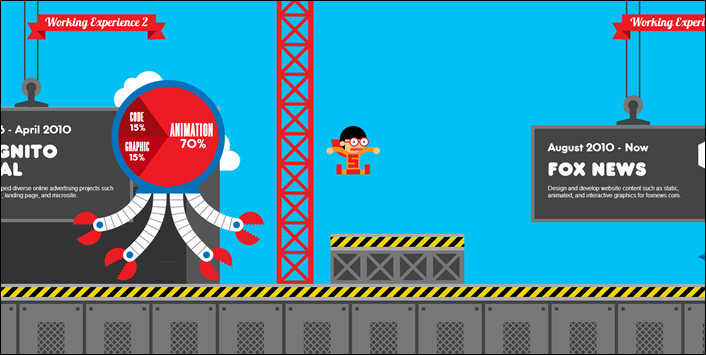
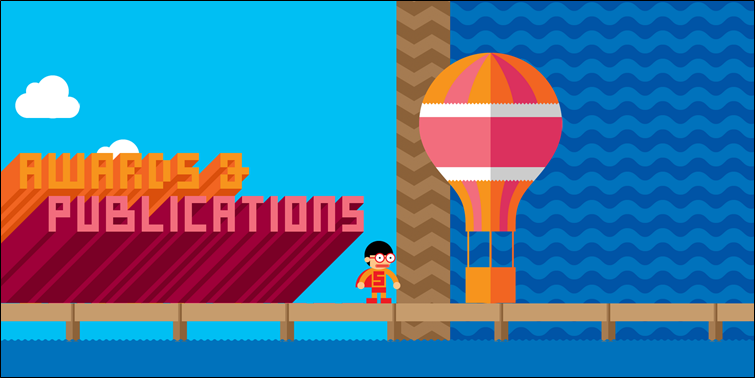
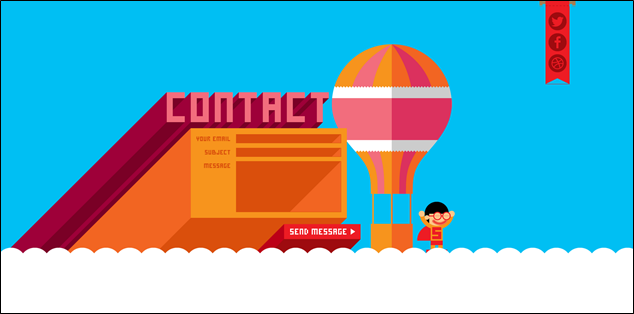
Robby got plenty of job offers from all over the world, and Baidu even copied Robby’s character without permission for it’s own use, but Robby didn’t get that one magic job offer he was looking for. And the search continues…
Sami managed to identify the job he’d always dreamed of. But how to get noticed and convince he was what the company was looking for…? Sami put in some extra effort and made a campaign out of his application process, explaining it all in a YouTube video.
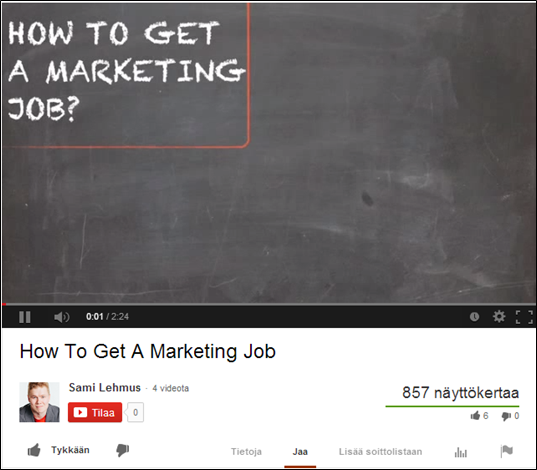
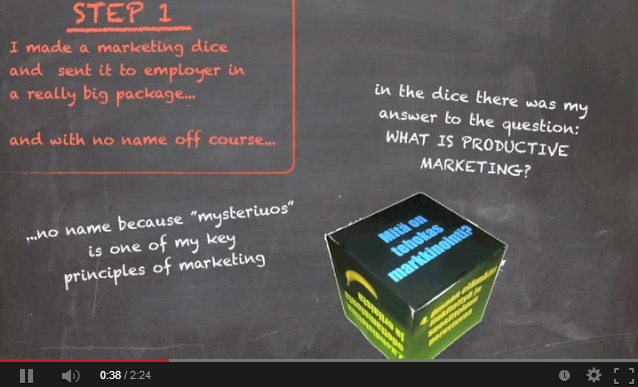
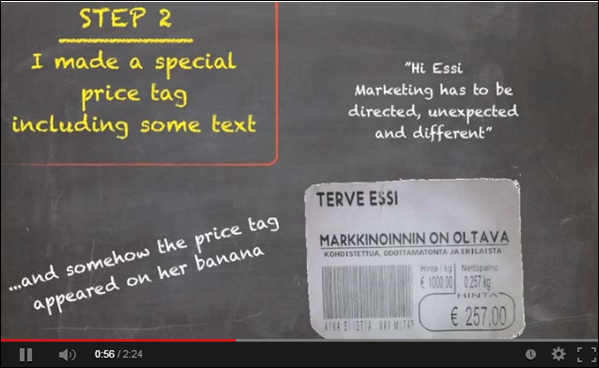
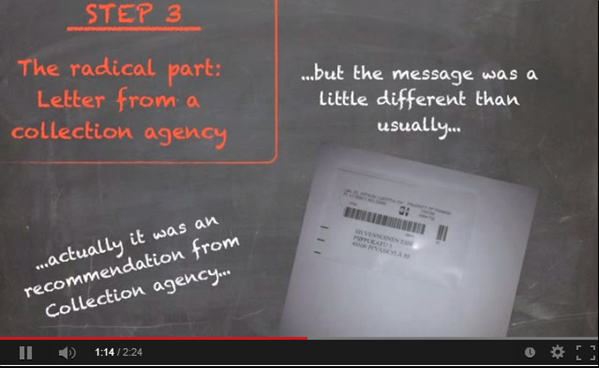
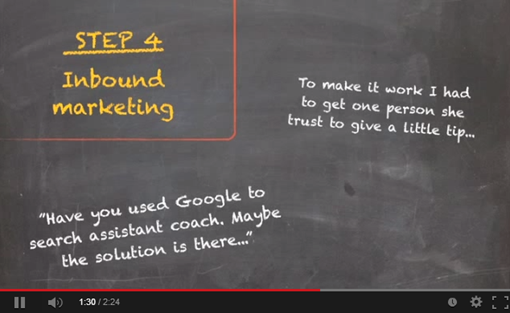
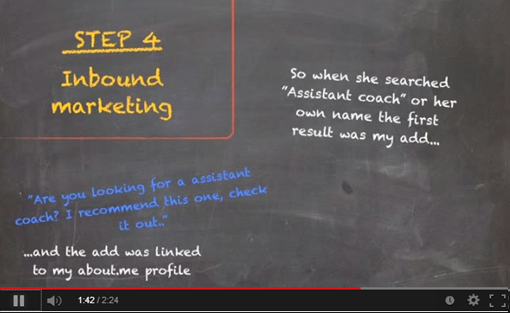
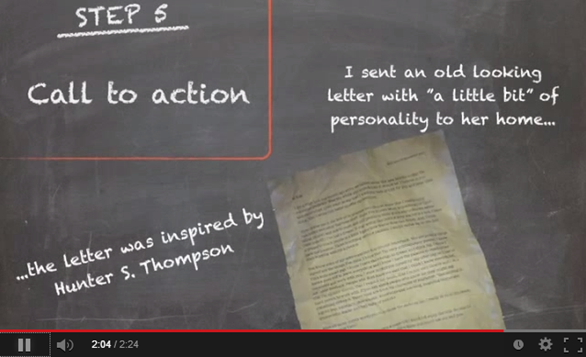
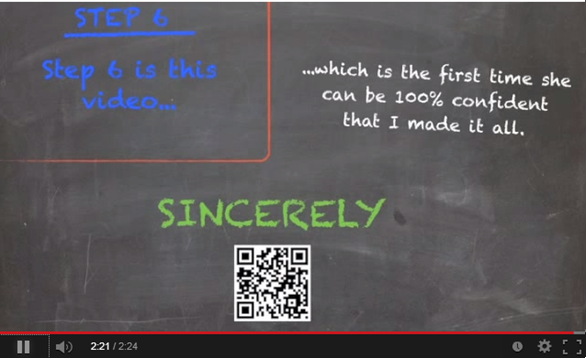
Going too far? Possibly. Scary? Yeah, a bit. Going the extra mile? Sure, if this doesn’t convince the hiring manager that this guy is serious about his application and motivated, nothing does.
Got other great examples in mind? Share it!
Want to ask me something? Send email to tom.laine@somehow.fi